| Srl | Item |
| 1 |
ID:
189936
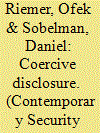

|
|
|
|
|
| Summary/Abstract |
Can intelligence serve as a coercive instrument in international relations? While coercion literature mostly addresses military and economic means, this article argues that coercion can also include the deliberate public disclosure of intelligence. Intelligence can be employed to threaten adversaries, reduce their latitude, and force them to adjust their plans and operations. Additionally, intelligence disclosure can be used to mobilize domestic and international audiences and make others align with a certain narrative and alter their policies accordingly. Still, coercive disclosure can fail or succeed only partially against a determined opponent or a target that is resilient to public and international pressure. To demonstrate the workings of coercive disclosure, we analyze Israel's campaign, beginning in 2017, against the Lebanese Hezbollah’s missile manufacturing program and Turkey's coercive campaign vis-à-vis Saudi Arabia and the United States following Jamal Khashoggi's assassination in 2018.
|
|
|
|
|
|
|
|
|
|
|
|
|
|
|
|
| 2 |
ID:
021239
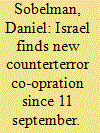

|
|
|
|
|
| Publication |
2002.
|
| Description |
24-29
|
|
|
|
|
|
|
|
|
|
|
|
|
|
|
|
| 3 |
ID:
061455
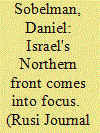

|
|
|
| 4 |
ID:
151075
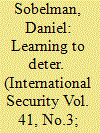

|
|
|
|
|
| Summary/Abstract |
What are the sources of deterrence stability and under what conditions can weak actors deter stronger adversaries? To deter a superior adversary, the weak actor must convince it that if conflict breaks out, the weak actor would be capable of rendering its opponent's strategic capabilities tactical and its own tactical capabilities strategic. The deterrence relationship that has evolved between Israel and the Lebanese Hezbollah in the decade since—and as a result of—the 2006 Lebanon War (a.k.a. the Second Lebanon War or the July War) confirms this observation. A comparison of these two actors’ deterrence behavior in the years preceding the war and in its aftermath shows that one of the leading explanations for the ongoing stability along the Israeli-Lebanese border is that Israel and Hezbollah have learned to apply deterrence in a manner that meets the prerequisites of rational deterrence theory.
|
|
|
|
|
|
|
|
|
|
|
|
|
|
|
|
| 5 |
ID:
193016
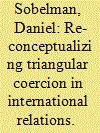

|
|
|
|
|
| Summary/Abstract |
Although coercion literature has traditionally focused on two-actor dyads, coercion in three-actor settings is a prevalent yet understudied strategy in International Relations. Such cases of “triangular coercion” represent a phenomenon whereby a coercer who lacks direct leverage over a resilient target coerces a third party who does possess leverage over the target, and to whom the target is vulnerable, and manipulates it into a clash of interests with the target. By forcing an otherwise uninvolved intermediary to align with the coercer, a coercer can alter the balance of vulnerability vis-à-vis its otherwise resilient target and enhance its susceptibility to coercion, albeit by extension. Existing scholarship tackles triangular coercion from different angles and mostly focuses on actor typology. This article seeks to promote our understanding of this strategy by proposing a conceptual model that distills its logic into the abstract components of vulnerability, resilience, and leverage. To demonstrate the dynamics of triangular coercion, the article draws on three empirical cases: Israel’s failed attempts to force Lebanon to rein in Hezbollah in the 1990s, Nazi Germany’s successful manipulation of Britain and France into coercing Czechoslovakia in 1938, and the Soviet Union’s success at forcing the United States to coerce Israel in 1973.
|
|
|
|
|
|
|
|
|
|
|
|
|
|
|
|